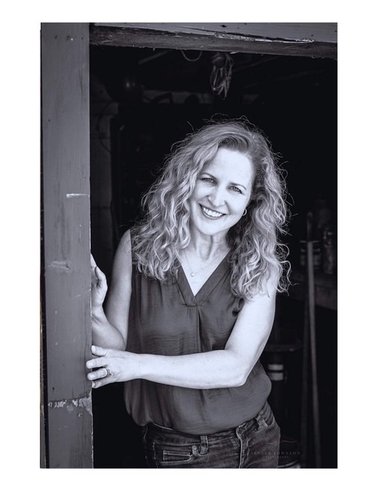Barcomb’s first novel tells a story of healing and hope
KNOX — When Jessica Perrin Barcomb was in her twenties, she fell through a stairwell and landed on her head. She was in a coma and had to be resuscitated several times.
It made her angry then when people told her that things happen for a reason.
But now she realizes she learned so much, especially on the road to recovery.
Barcomb has just published her first novel, which opens with the description of a terrible car accident. The book’s central character, Rebecca, at age 7, survives, after a coma, but her beloved mother, a healer, dies.
Barcomb, who has wanted to be a writer her whole life, stresses in this week’s Enterprise podcast, that the book is not autobiographical. Even so, she has drawn on many of her real-life experiences to make it vivid.
The novel is at one a romance, as Rebecca works through relationships with several men to define herself, and is also a testimonial to the powers of alternative medicine for healing.
A real marker in Barcomb’s own recovery, she says, was going to live with her grandmother to help her after she had suffered a stroke.
“We all want to help each other ….,” she says. “Ultimately, we are all in this together.”
Barcomb became a craniosacral therapist, something the book’s Rebecca ends up pursuing. Just as Rebecca, in the novel, says that Western medicine saved her life, Barcomb says, “Western medicine is awesome” and notes her twin brother holds both an M.D. and a Ph.D.
But both the author, Jessica Barcomb, and the character she created, Rebecca Carroll, believe Western medicine falls short with important aspects of healing.
“One of the biggest problems we have is mental health and spiritual health in this country …. recognizing the other dimensions that we have all around us,” says Barcomb.
When she practices craniosacral therapy — she’s owned a wellness studio for more than two decades — Barcomb uses a touch as light as a nickel to “tap into the different craniosacral rhythms of the body.” She says it can help not just with physical ailments, like a hurt knee or ankle, but with things like depression or trauma.
“People have to be willing to let go and to release what it is they’re holding onto,” she says.
The name of her book is “Letting Go.”
The novel’s most enduring relationship, more central to the book than the men with whom Rebecca is involved, is the friendship between Sarah and Rebecca. They were best friends since they were girls and were driven apart by Rebecca’s first love but reunited by the end of the book.
Sarah has chosen a path of being a stay-at-home mother, raising three young children on a farm in the Helderberg Hilltowns.
“It’s important for people to recognize the challenges that women have ….,” says Barcomb. “How they need each other for support and how oftentimes they don’t get a whole lot of support …. It’s not easy being a mom … trying to do it all.”
A feminist theme runs though the book; while Rebecca studies art at New York University, Sarah, in her college years, is a women’s studies major who travels to Europe to learn about the persecution of witches.
Often women who were healers and midwives were targeted as witches, says Barcomb. The novel’s Rebecca discovers a book dating back to her great-great-great-great-grandmother who was a healer living in Salem, Massachusetts in the 1600s.
Many of today’s craniosacral therapists are women, Barcomb says, just as many of the Salem residents hanged for witchcraft in the 1600s were women.
Barcomb notes that often history is told from a male perspective. “We just don’t know the other half of the story that well,” she says. She wants her readers to think about “how women have been treated throughout history and their roles and how they’ve been downplayed and often silenced.”
For her research, Barcomb and her husband journeyed to Salem and stayed in the same inn where Rebecca stayed with a male friend. Just like the characters in her book, Barcomb says, “There were explosions when I was there and my husband went to the window and I opened my eyes and saw a ghost.”
As she was writing the book, Barcomb learned her own ancestors had lived in Salem in the 1600s, moving to Boston before the witch trials, similar to Rebecca’s history.
Barcomb worked on her novel for years, taking a five-year break between the first and final draft. When her children were young — like the novel’s Sarah, she and her husband raised them in a Hilltown farmhouse — Barcomb worked on her writing in spaces and places wherever she could.
When her daughter was in ballet class, Barcomb said, she would write on her laptop in the car. When her son was at piano lessons, the teacher let her use a spare room to write in.
Barcomb hopes that “Letting Go” is the first of a trilogy and thinks she’ll have more time to write now that her children are older.
She believes women are a likely audience for “Letting Go” but hopes men read it too.
“I’m hoping,” she says, “it opens up a discussion about healing and about what’s important about it and how we can do it better as a society.”
****
“Letting Go,” a 308-page paperback, is available through Amazon for $16 and will soon be in local bookstores.
Jessica Perrin Barcomb will be signing her novel at the Open Door Bookstore at 128 Jay St. in Schenectady on Saturday, Feb. 5, from 1 to 2:30 p.m.



